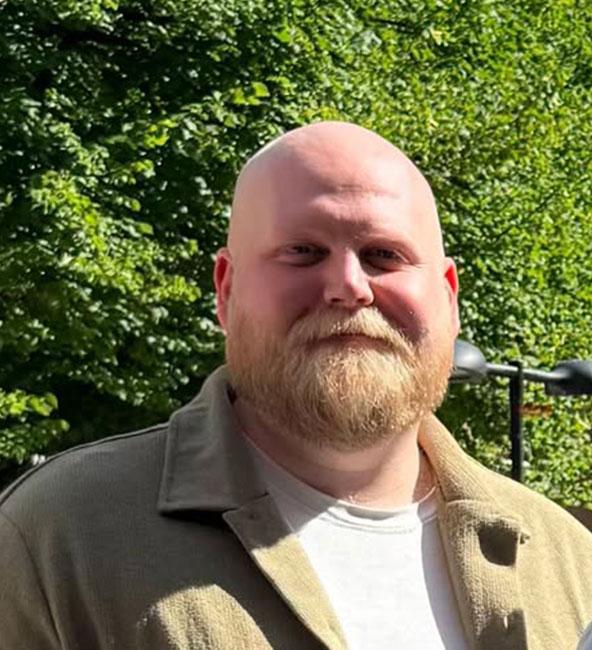WILLIAM GRANBERG, STUDENT IN THE MASTER'S PROGRAM IN CRITICAL SOCIAL ANALYSIS
Read the interview with William, a student in the Master's program in Critical Social Analysis.

WHAT IS YOUR BACKGROUND? WHERE ARE YOU FROM, AND WHAT DID YOU STUDY BEFORE STARTING THE MASTER'S PROGRAM?
– My name is William Granberg, I am 29 years old, and I live in Örebro. I previously worked as a warehouse worker/assembler. After six years of working, I decided to start studying. I have always been interested in social challenges and societal issues. Choosing social analysis with sociology as my major was a coincidence, but it could not have turned out better. Previously, I studied the Bachelor's program in Social Analysis as well as the course "Risk and Crisis in Modern Society" at Örebro University. Now, I am in my final semester of the Master's program in Critical Social Analysis.
WHY DID YOU CHOOSE TO STUDY THE MASTER'S PROGRAM IN CRITICAL SOCIAL ANALYSIS?
– After my studies at Örebro University, I did not feel quite done as a student. I searched among different Master's programs focused on sociology and found this program. The introduction text caught my interest right away. Since I had previously studied social analysis at the Bachelor's level and found it interesting, this Master's program suited me well. Another reason I chose this program was its broad scope. Other Master's programs were more limited to specific research areas or societal phenomena. The broad focus of this program provides the opportunity to explore new perspectives on social issues and to deepen knowledge of already familiar societal phenomena.
WHAT HAS BEEN THE MOST INTERESTING PART OF THE PROGRAM SO FAR?
– It is difficult to choose something specific because everything has been interesting and educational. In general, I have appreciated that the program provides the ability to study sociological perspectives with a critical lens. At the Bachelor's level, it was more about explaining and applying a theory and method to a social issue. In the Master's program, this is complemented by the ability to critically reflect on theory and method.
The courses on sustainability issues have been particularly interesting. My interest in sustainability issues in a sociological context has deepened during my studies. The opportunity to explore different topics creates an interesting, educational, and enjoyable study environment.
I have also appreciated the methodology courses. Previously, I found methodology courses to be rigid and structured, but here they have been flexible and encouraged working with methods based on the student's interests. Additionally, all courses in the Master's program allow for more discussion with teachers than at the Bachelor's level.
DO YOU HAVE ANY TIPS FOR STUDENTS IN BACHELOR'S PROGRAMS?
– Do not be discouraged by the perception that Master's programs are too challenging. I thought so myself before I started. In hindsight, I can say that it is a demanding time, but that is exactly what makes it more fun, educational, and interesting. The tools and competencies from the Bachelor's level make the transition natural. Dare to apply!
In Master's programs, there are often fewer students, which allows for more discussion and reflection with both fellow students and teachers. These opportunities are invaluable—make the most of them!
Reflect on what you find interesting already during your undergraduate studies. This makes it easier to find a Master's program that suits you. For me, sustainability issues in a sociological context sparked my interest in this program. But it is not a "deal-breaker" if you have not identified a specific topic. The breadth of the Master's program allows you to explore new social issues, theories, and methods, so you can find something that truly interests you.
Make use of study and career counselors! During the program, career coaching was available, which was valuable for me. It helped me find an internship that suited my interests and to understand what skills I have and how I can contribute in the job market.
WHAT ARE YOUR FUTURE PLANS?
– I am excited to start working. During my internship, I got an insight into what my future role could look like and what skills I can contribute to the job market. I hope to work with sustainability issues and change management. After five years in academia, I am curious about what working life has to offer.
I do not rule out pursuing a PhD position, depending on how it aligns with my research interests. It is not unlikely that after a few years in the job market, I will feel the pull back to academia.

